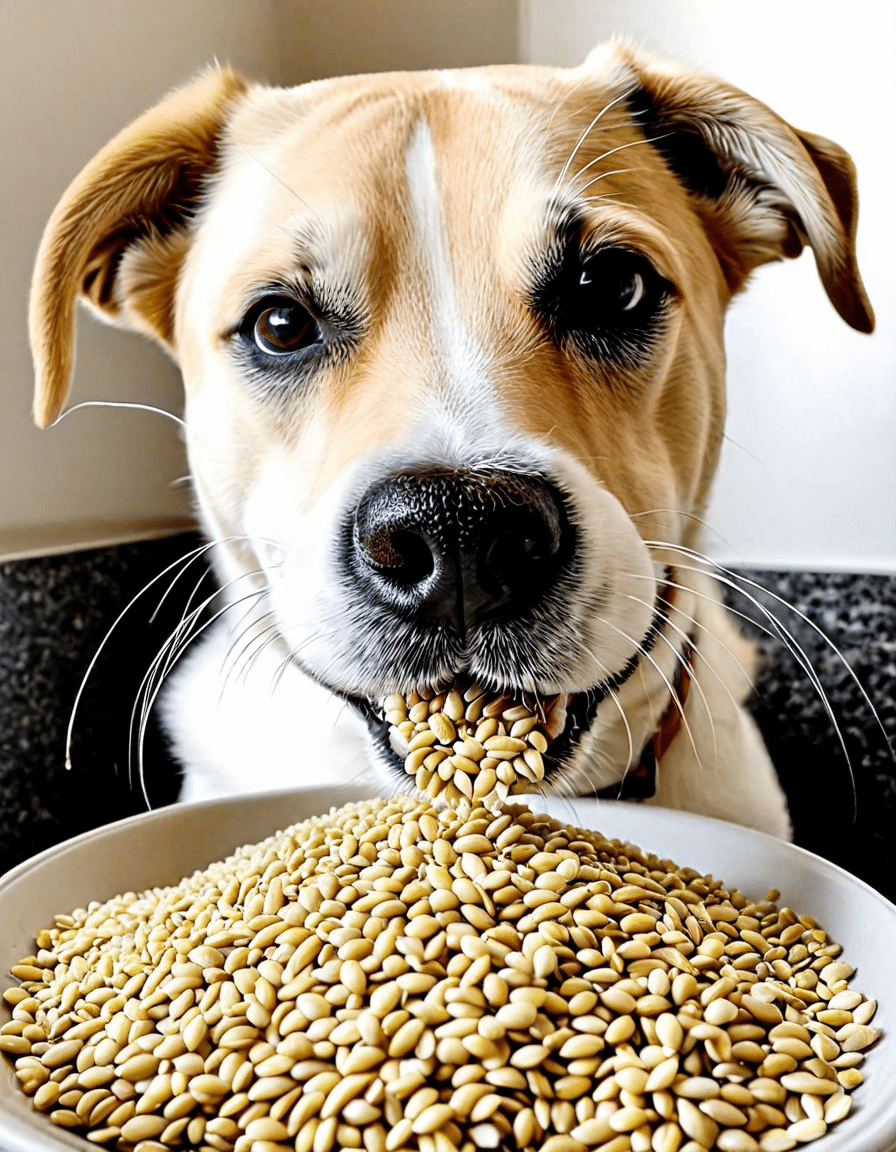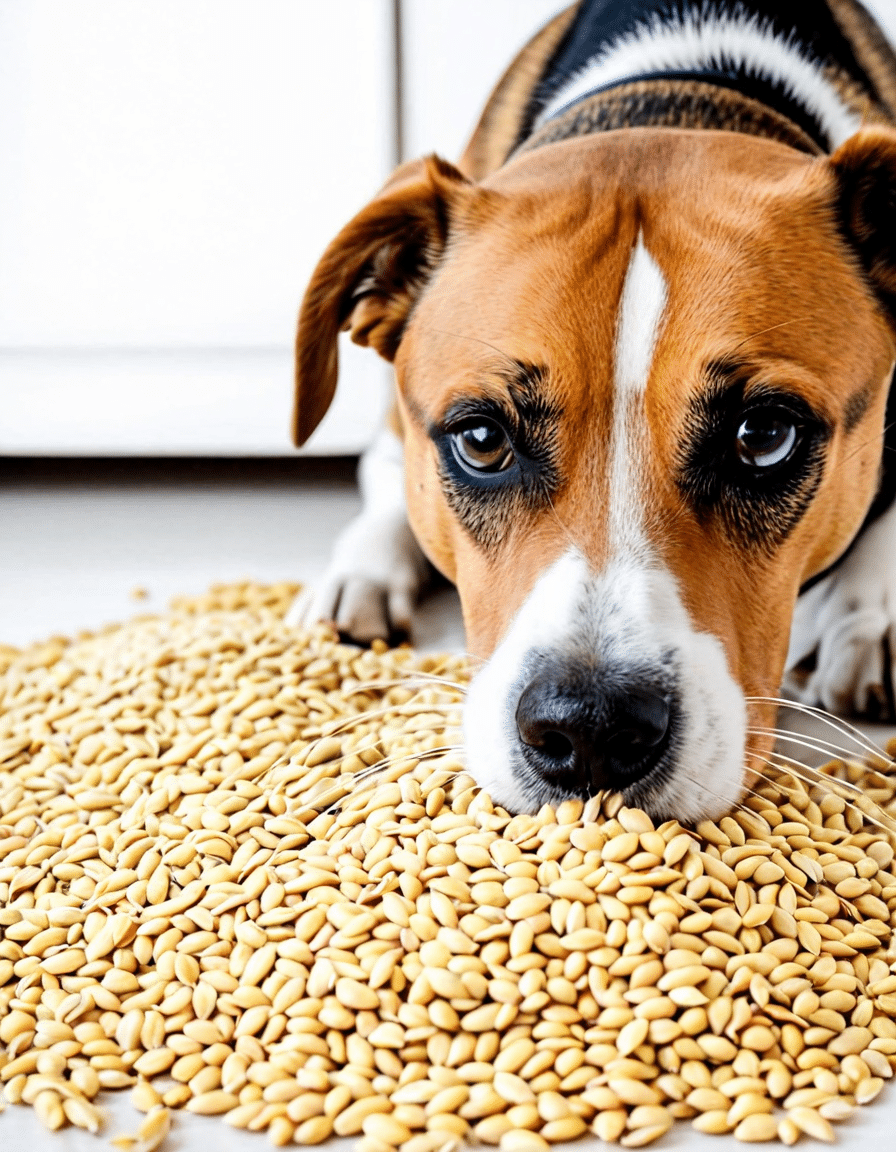When considering what to feed our furry friends, many dog owners might wonder, should dogs eat sesame seeds? These tiny seeds from the Sesamum indicum plant have gained traction as potential health boosters. Not only are sesame seeds rich in nutrients, but they also offer a variety of health benefits that could be advantageous for dogs. However, before making any changes to your pup’s diet, it’s essential to weigh both the benefits and any possible risks.
Understanding Sesame Seeds and Their Nutritional Profile
Sesame seeds, often used in cooking and baking, are small, oval seeds that bring a nutty flavor to various dishes. They’re bursting with nutrients, making them an appealing option for those considering adding them to their dog’s meals. Notably, sesame seeds contain:
So, why would a dog owner want to incorporate sesame seeds into their pets’ diets? It’s good to start with their impressive nutrient profile.

5 Health Benefits of Sesame Seeds for Dogs
1. Rich Source of Healthy Fats: Just like humans, dogs benefit from a diet rich in healthy fats. Sesame seeds are a fantastic source of omega-3 and omega-6 fatty acids, which help to keep your dog’s skin healthy and coat shiny. If your pup suffers from dry skin or allergies, these fatty acids can serve as an effective remedy.
2. Packed with Antioxidants: Sesame seeds are loaded with antioxidants like sesamol and sesamin. These compounds help combat oxidative stress, a major concern, especially for older dogs who may experience health challenges. By adding sesame seeds to your dog’s diet, you could help enhance their overall longevity and well-being.
3. Digestive Health Support: Thanks to their fiber content, sesame seeds can promote better digestion in your dog. Regular consumption of fiber can help regulate bowel movements and reduce the occurrence of constipation, ensuring your pup stays comfortable and healthy in that department.
4. Bone Health: With their rich calcium content, sesame seeds can be a boon for maintaining strong bones and teeth. This is particularly crucial for larger breeds that face a higher risk of developing joint and bone issues as they age.
5. Potential Anti-Inflammatory Properties: Some emerging studies suggest that sesame seeds might help reduce inflammation. This could be particularly beneficial for dogs suffering from arthritis or other inflammatory conditions, potentially offering some much-needed relief.
Are There Health Risks? What You Need to Know
Even though sesame seeds have numerous benefits, it’s crucial to prioritize safety when introducing new foods to your dog’s diet. Here’s what you should keep in mind:

Common Questions About Sesame Seeds and Pet Diets
As a responsible pet owner, you might have questions about how sesame seeds compare to other seeds and safe vegetables for dogs. Here’s a little rundown:
Real-Life Applications: Popular Products and Brands
Many dog food brands are catching on to the health benefits of incorporating seeds into their recipes. For example, Orijen has a dog food formula that features nutrient-dense seeds, including sesame, aimed at providing a balanced diet full of natural ingredients. Similarly, Taste of the Wild is known for including pumpkin seeds, alongside other beneficial fibers and proteins, perfectly suited to meet a dog’s nutritional needs.
Innovating Your Dog’s Diet with Sesame Seeds
Incorporating sesame seeds into your dog’s meals can be a delightful new twist for both you and your pup. Imagine adding a light sprinkle of ground sesame seeds over homemade treats or blending them into your dog’s regular food to boost nutrition. Experimenting with such natural ingredients expands your pet’s diet while providing essential health benefits.
By including a variety of ingredients like sesame seeds, you cater to your dog’s health holistically. With every bite, you help support their wellbeing and vitality. Sharing nutritional knowledge and responsibly exploring new food options can significantly enhance your beloved pet’s life.
So next time you’re considering what to feed your furry friend, keep Sesame seeds in mind. Who knows? They might just turn out to be your dog’s new favorite treat!
Always consult your veterinarian before making dietary changes for your pets. Happy feeding!
Should Dogs Eat Sesame Seeds? Fun Trivia and Interesting Facts
When thinking about whether dogs should eat sesame seeds, it’s essential to understand their nutritional profile. These tiny seeds are packed with benefits, containing healthy fats, protein, and essential minerals. Interestingly, just like the charming, yet rare Tri Color border collie, these seeds aren’t commonly found in dog diets but can be a fun addition in moderation. So, if you’re considering a sprinkle on homemade treats, it might just be worth a look!
Now, speaking of interesting facts, did you know that sesame seeds have been used as a source of nutrition for thousands of years? Cultures around the world have celebrated their health benefits. However, similar to the playful yet compact Black Jack russell terrier, not every food is suitable for our furry friends. While some canines might enjoy a taste, it’s always wise to introduce new foods gradually. Speaking of food, everyone’s favorite little snack,Yummy Yummy, reflects how our culinary choices can become equally appealing to dogs in the right context.
On a different note, keeping your pooch’s diet clean is crucial, especially if they have a habit of munching on things they shouldn’t—if only stopping that behavior were as easy as figuring out the best States For retirement! If you’re ever faced with the conundrum of How To stop Dogs From eating poop, introducing healthy, safe snacks, like a sprinkle of sesame seeds, could help. Just ensure you monitor their reactions, since every dog’s digestive system reacts differently to new additions. So, what’s the final verdict on whether dogs should eat sesame seeds? Ultimately, moderation is key, and it’s always good to consult your vet before making major dietary changes.



